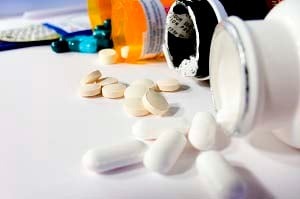
All medications, prescription and over-the-counter (OTC), have benefits as well as risks associated with their use. The risks may include side effects, allergic reactions, and interactions with foods, drinks, or other drugs. You can increase the potential benefits and reduce potential risks by taking medications properly. It is estimated that up to half of all people who use medications do not use them as prescribed.
The first step is asking your doctor and/or pharmacist very specific questions with each new drug you are prescribed:
- What is the name and purpose of the medication?
- What time of day do I take it, with food or without, and for how long?
- What are the potential side effects and what should I do if they occur?
- What should I do if I miss a dose?
- Should I swallow it whole or can it be crushed?
- Will this drug interact with any other medications I am currently taking – prescription, OTC, or herbal?
- While taking this medication, should I avoid certain foods, alcohol, or dietary supplements?
Following these simple procedures will also help you to increase the safety and efficacy of your medication:
- Utilize one pharmacy to fill all of your prescriptions.
- Have a written log of all of your medications, their intended use, dosage amount and time.
- Never stop taking a medication the doctor has instructed you to finish just because symptoms are in remission.
- Talk to your doctor or pharmacist before using OTC medications, dietary or herbal supplements, especially if you are taking other medications.
- Store medication in its original container, where the label can identify usage information and expiration date.
- If you see multiple doctors, have your primary doctor help you develop a schedule for taking your medications.
Also, tell your doctor if you:
- Are pregnant, breastfeeding, or intend to become pregnant in the near future.
- Use alcohol or tobacco.
- Have other health conditions, especially diabetes, liver, or kidney disease.
- Take other prescription, OTC, or herbal medications.
- Follow a restricted diet or have food or other allergies.
More Medication Topics
More Information
For more information on taking medications, visit the FDA website’s page Six Tips to Avoid Medication Mistakes.
Source: Adapted from FDA’s Tips for Taking Medicine, by Dixie Farley, FDA Consumer, November 1995 (Updated December 1997); the text of this article is not copyrighted.
